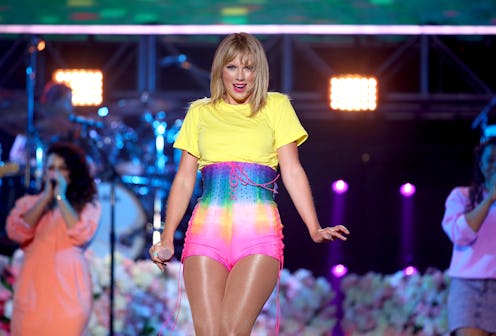Entertainment
Here’s How Scooter Braun Was Able To Buy The Rights To Taylor Swift’s Music

On Sunday, June 30, it was announced that Scooter Braun and his company, Ithaca Holdings LLC, acquired Scott Borchetta’s Big Machine Label Group in a deal that’s reportedly worth over $300 million. Through buying Borchetta’s company, Braun now also has ownership of Taylor Swift’s master recordings made when she was with the label, including her first six albums. Swift is not happy about the new owner of her catalog and made her feelings publicly known, which made some people ask a very important question: why doesn’t Taylor Swift own the rights to her own music?
In most cases, as reported by AWAL, when an artist signs with a major record label, they give up the rights to their own recordings — known as the masters in the music industry — to the label itself, in exchange for an advance recoupable against the artist's royalties. Moreover, the owners of an artist's master recordings not only profit from every sale or stream of that artist's work, but are also able to license the recordings for use in mediums like TV, film, and advertisements, and reap the financial benefit of said deals.
So why are most artists not able to own the rights to the music they created? Well, firstly, many artists are swayed by the lucrative chance to have their music be promoted by a major record label, who have connections and provide opportunities that many independent artists usually wouldn't receive on their own. And once they are successful enough, there can be an opportunity to get back their masters back by recouping their advances, essentially buying them back, per AWAL. However, some artists' catalogs can reach enormous heights in value, preventing even successful artists from being afforded that opportunity.
For uber-successful artists like Swift, their catalog of hits is just too valuable, and as in Swift's case, can sometimes considered more valuable than the artists themselves. As far back as 2015, Borchetta was thinking about putting Big Machine on the market. As reported by Billboard in August 2018, if he had sold Swift back her masters back then, as she wanted, the value of his company would have dropped drastically, with one source estimating that the singer’s catalog could be worth hundreds of millions of dollars in her lifetime.
Owning her masters has been a priority for Swift. It was a sticking point in her negotiations to renew her contract with Big Machine, with both Swift and Borchetta acknowledging that an offer was made by the label for Swift to buy her masters back in their recent statements. But as Swift wrote in her scathing Tumblr post disapproving of Braun owning her catalog, Big Machine's alleged proposal was that Swift would slowly gain back ownership of her masters by earning one past album for every new album that she turned into the label. "I walked away because I knew once I signed that contract, Scott Borchetta would sell the label, thereby selling me and my future," she said. For his part, Borchetta denied that these were the terms of the contract in a statement released late on June 30, instead claiming that the contract was for another 10 years with the label. Bustle reached out to Swift regarding Borchetta's claims, but did not hear back at the time of publication.
Regardless of the specifics, the idea that Swift must earn back the music she created by tying herself into another contract sounds degrading and unfair. And given the circumstances, it's not surprising that Swift left the label. She has since signed a new contract with Republic Records on the condition that she would own the masters of her recordings from this point on, starting with her upcoming album Lover, out on August 23.
It seems logical that singer-songwriters, especially ones as powerful as Swift, should have the rights to their life's work, music that they poured their heart and soul into creating. The sad reality is that very few artists actually own their masters. In 2016, Vogue reported that Rihanna was able to acquire the masters of all her previous albums prior to Anti from her former label Def Jam. Similarly, Jay-Z negotiated the rights to his catalog when he became the president of Def Jam in 2004, according to Forbes. But these are notable exceptions among major artists.
The tides are changing, slowly but surely. Some newer artists like SZA and 21 Savage have been able to negotiate the ownership of their masters as they signed major label deals. As reported by DJBooth, the artists were able to leverage their online following and general buzz, something that wasn't as prevalent when Swift was first signed with Big Machine over a decade ago.
Swift might not own her past masters, but she's not giving up. And her public fight for the right of all artists to own their work is already an important step in the right direction.